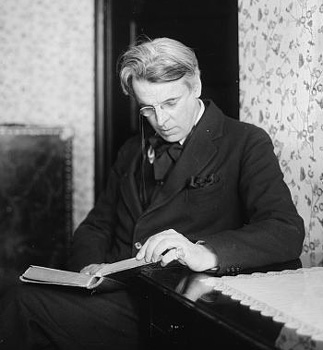 "To free from a controlling force or influence." That sounds to me like something we should all want. It's a definition of the verb "disen- thrall" and I take note of it having just listened to a short talk by Sir Ken Robinson. One of the TED talks. I came across it thanks to the Open Culture website, which I find so enjoyable. In his talk Robinson quotes Abraham Lincoln's second annual message to Congress, in which the sixteenth president (and don't forget, poet!), concludes one of the final paragraphs of the long document in this manner: "We must disenthrall ourselves, and then we shall save our country." To me it's fascinating that Lincoln uses the verb reflexively, without stating from what we must disenthrall. But it is clear that he is referring, generally, to the present circumstances, the usual way of thinking. And the usual thinking in 1862 accepted slavery, and this is what Lincoln is really arguing for, an end to slavery, and he makes this explicit in the next paragraph.
"To free from a controlling force or influence." That sounds to me like something we should all want. It's a definition of the verb "disen- thrall" and I take note of it having just listened to a short talk by Sir Ken Robinson. One of the TED talks. I came across it thanks to the Open Culture website, which I find so enjoyable. In his talk Robinson quotes Abraham Lincoln's second annual message to Congress, in which the sixteenth president (and don't forget, poet!), concludes one of the final paragraphs of the long document in this manner: "We must disenthrall ourselves, and then we shall save our country." To me it's fascinating that Lincoln uses the verb reflexively, without stating from what we must disenthrall. But it is clear that he is referring, generally, to the present circumstances, the usual way of thinking. And the usual thinking in 1862 accepted slavery, and this is what Lincoln is really arguing for, an end to slavery, and he makes this explicit in the next paragraph. Robinson quotes Lincoln admiringly, and his context is education, and his belief in the need for a revolution in how we educate people. He argues for "personalized learning". The talk is short on details. That's too generous: there are absolutely no details at all; it's a concept, an idea... But in spite of its generalities and clichés it's a very good talk, and exemplifies (I'm thinking of my students) quoting to good effect. Robinson ends by reciting Yeat's famous "Aedh Wishes for the Cloths of Heaven", which ends, "Tread softly because you tread on my dreams". (That's W.B. Yeats in the image, above.) Robinson urges us to tread softly with our children, who everyday put their dreams at our feet. Yes, we should tread softly, but not just any old way. Let's tread imaginatively. The talk can he heard here.
So, let's disenthrall. Assume nothing, restart, recreate. Or, as ol' Abe had it, "The way is plain, peaceful, generous, just..."

No comments:
Post a Comment